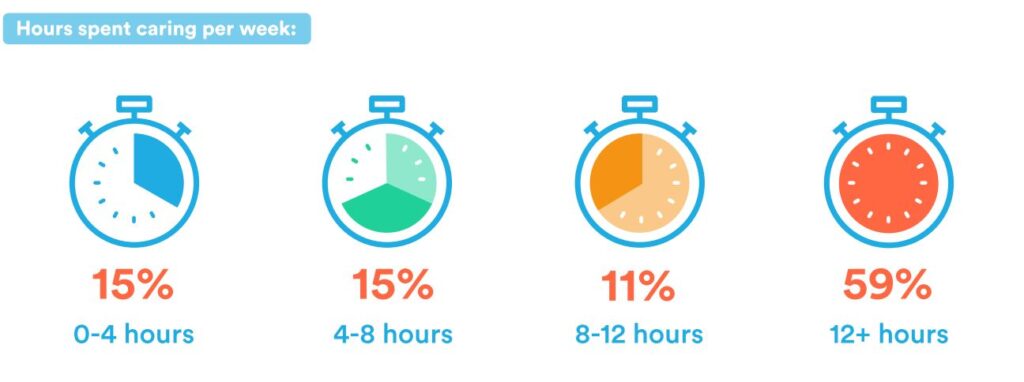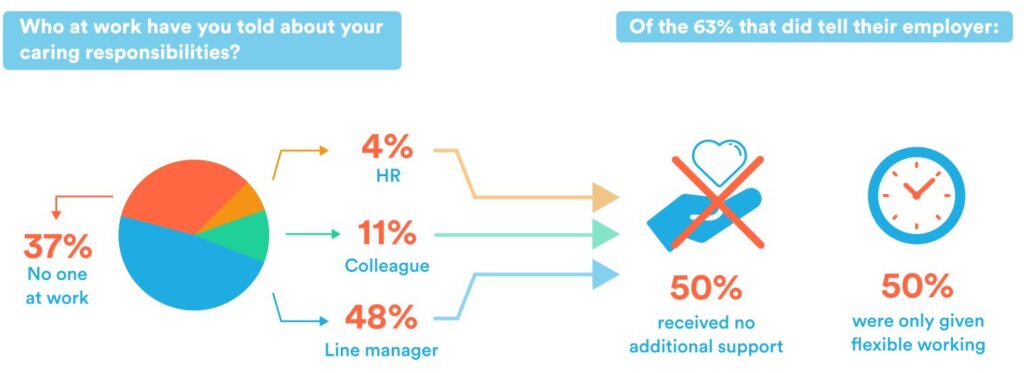5 million people in the UK are juggling caring responsibilities with work, that’s 1 in 7 of the workforce1. But are employers doing enough to support the needs of these employees?
Carers’ Week 2021 gave Everymind at Work the opportunity to reach out to working carers to find out what it is they really want/need from their employers; and how balancing work and caring responsibilities impacts their overall wellbeing and work life.
What is a working carer?
A carer is defined as someone who provides unpaid support and care for someone who has an illness, disability, mental health problem and/or addiction. A working carer is therefore someone who is in full or part-time employment and also provides this unpaid support.
One of the biggest issues we face is that many people avoid labelling themselves as a carer when they’re close to the person they are caring for; they see the tasks they undertake as part and parcel of their commitment to the individual. This is especially true when being someone’s carer probably only describes part of their relationship with them – they may also be a parent, partner, sister, brother, child, friend or another family member.
It was, therefore, no surprise that 35% of carers in our survey would not have previously labelled themselves as such.
Another issue we are currently facing when it comes to working carers concerns the UK’s ageing population. With an ageing population comes an ageing workforce, which means more workers are becoming working carers and the ‘sandwich generation’ is increasing. The sandwich generation refers to middle-aged adults (often aged between 40 and 50) who are caring for both elderly parents and their children. Both of these factors could help explain the rising numbers of working carers in the UK and highlight the need for employers to do more.
To understand more about what a working carer is, why not take a look at our blog post on What it Takes to Be a Carer From Those Who Are.
The impact of being a working carer on wellbeing
“My health is at the bottom of the priority list”
The effects of caring on wellbeing are neither linear nor causal. Instead, the impact can be influenced by many factors such as time spent caring and the number of competing demands. Working carers are therefore at a greater risk of their health being negatively impacted, due to the physical, emotional and psychological demands of juggling work and caring responsibilities.
Nearly two thirds (59%) of the carers surveyed spend more than 12 hours per week caring for another person and a recent CIPD report suggests that 28% of carers who work full-time also provide at least 30 hours of care per week3 – which is essentially the equivalent to a second full-time job. The strain this can put on an individual puts their wellbeing at risk and amplifies the adoption of an unhealthy lifestyle and coping mechanisms.

“There is very little time to look after my own wellbeing”
100% of carers surveyed said that their wellbeing suffers as part of balancing caring with other life priorities. Most working carers agreed that all aspects of wellbeing (mental, emotional, social, physical, spiritual, financial) were impacted, with the following effects being most troublesome:
| – Fatigue and exhaustion – Increased stress – Lack of energy – Difficulties with sleep – Anger and frustration | – Anxiety – Depression – Guilt – Struggle to maintain weight – Relationships suffering |
The impact of caring on work
“Balancing work and caring is hard, I feel like I can’t do a good job in either”
Juggling caring responsibilities with work isn’t easy. That’s why 600 people give up work every day to care for a loved one and 2 million working carers have had to reduce their working hours2 to be able to do both. This means that organisations are losing talent, especially those that are not creating carer-friendly workplaces.
Our survey found that 62% of carers feel that their caring responsibilities affect their ability to fulfil their job role. Common effects of caring on work include: poor concentration, increased stress and absenteeism, inhibited career development through turning down promotions or not applying for them in the first place, reduction in working hours or giving up their job completely.
Most notably, a staggering 37% of carers have not told their employer about their caring responsibilities. This was mainly because they felt nothing would change if they were to disclose this information anyway.
Sadly, of those who have told their employer about their caring responsibilities, 50% received no additional support. The 50% who did receive ‘additional support’ were only given flexible working which carers feel is not enough.

What do working carers want from their employer?
“It would be helpful if my employer cared that I was a carer”
Support from the employer can make a huge difference to an individual’s ability to balance their caring and work responsibilities.
A recent CIPD guide recommends that employers should do the following to be a ‘carer-friendly workplace’:
- Develop and communicate a carer policy, framework or guidance
- Introduce flexible working to support working carers (this could be flexible start/finish times; accommodating medical appointments; in the occurrence of emergencies; or working from home if and when required)
- Provide carers’ leave (paid or unpaid) and be adaptable when carers need to leave at short notice
- Help line managers to empower carers
- Provide information and peer-to-peer support
We believe that all of these recommendations from the CIPD should be implemented as the basic standard for all working carers. However, when speaking to carers, we found that they are missing the human element from the support they are receiving.
Working carers want:
- Empathy, understanding and acceptance
- To be recognised
- People to speak to
- Support for their own wellbeing
- A safe space to have a break when feeling overwhelmed
- Additional support with prioritising workload
- Help setting realistic goals, objectives and deadlines
Most importantly, working carers want their employer to CARE.
To download a poster summary of the statistics found in our 2021 survey, click here.
Sources:
1Carers UK (2019). Facts about carers.
2Carers UK (2019). Juggling work and unpaid care.
3CIPD (2020). Supporting working carers.








